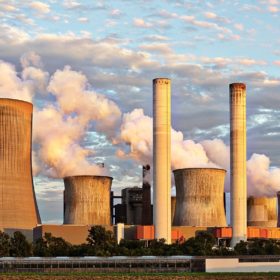
The Japanese tech giant and German power company have followed the lead of General Electric by promising not to take on any new coal power station contracts.
Big names in industry are cold-shouldering coal with two big technology conglomerates yesterday announcing they would exit the coal-fired power plant business. Siemens Energy and Toshiba pledged to discontinue their coal-fired power stations businesses, disclosing their new strategy on the back of quarterly earnings reports.
In the wake of Japan's newly-appointed prime minister Yoshihide Suga vowing to put the country on a path to carbon neutrality by 2050, one of the country's biggest brands, Toshiba, backed the government by outlining its ‘environmental future vision 2050.'
The “Toshiba Next Plan” is part of the strategy and will see the company stop accepting orders for turbines and other equipment for coal-fired power stations. In that vein, Toshiba also announced plans to increase its investment into renewables by a factor of three over the next decade. Doing so will unlock the potential to halve the company's greenhouse gas emissions by 2030, compared to its 2019 figure.
Big investments
The company's clean energy investment reached ¥190 billion ($1.8 billion) in 2018-19 and that figure projected to increase to ¥350 billion in 2024-25, and a thumping ¥650 billion for 2029-30. Toshiba said the plan is to diversify investment into solar and wind power, infrastructure, virtual power plants (VPPs), and hydrogen systems, with an accent on solar and wind, VPPs and hydrogen this decade.
The electronics giant also stated ambitions to become Japan's leading solar plant business and to develop the world's most efficient solar technology, using perovskite and thin-film approaches. At the same time, added Toshiba, it does not intend to surrender what it claims is its market-leading position for battery fast charging and power-to-gas hydrogen technology.
While the business will not abandon steam turbine manufacturing entirely, it will supply its products to geothermal power stations in future, Toshiba said. The company is estimated by Japanese media company Nikkei Asia to supply 11% of the world's global thermal generation fleet outside China and is expected to fulfill ten outstanding contracts to complete coal-fired power stations in its homeland as well as in Vietnam “and other countries.”
Siemens
Siemens Energy has announced it will no longer participate in tenders related to power plants which will run exclusively on coal.
The company will, however, honor existing commitments including the extension of PT Indo Raya Tenaga's coal power fleet in Indonesia. Siemens has been tasked with supplying its SST-6000 steam turbines to the planned JAWA 9 and 10 plant blocks, which will have a cumulative generation capacity of 2 GW, cost around $3 billion, and come online in 2023 and 2024. The project is temporarily stalled and facing challenges over environmental concerns raised by Korean and Indonesian litigants last year. Korean environmental groups became involved after several Korean banks, including the Korean Development Bank, pledged to finance the project.
Siemens' involvement in fossil fuel projects, primarily the Adani coal mine in Australia, has put the company firmly in the crosshairs of the German chapter of climate activist group Fridays for Future. The Adani involvement, well-publicized in German media at the start of the year, culminated in Siemens CEO Joe Kaeser offering Fridays for Future spokeswoman Luisa Neubauer a supervisory board position at Siemens Energy. The 23-year-old turned down the offer and advised the chief executive to appoint a scientist instead.
Since then, Siemens Energy has been put on the spot multiple times over its fossil-fuel activities. The business, formed through a merger of Siemens' Gas and Power and Gamesa Renewable Energy divisions, has seen its order book fall 24% to €7 billion, from €9 billion, and revenues retreat 8%, mainly because of Covid-related project delays and referrals in the gas and power business. By comparison, the renewables business only had to concede 3% of revenues in the wake of the Covid-19 crisis.
Excluding coal from its portfolios does not mean Siemens and Toshiba will commit to fully decarbonizing as the companies assert combined heat and power generators fired by natural gas will be a significant “bridge-technology” in the energy transition.
Environmental concerns
Natural gas primarily comprises methane, a hugely potent greenhouse gas said to be 90 times more effective at trapping heat than carbon dioxide. The article Preindustrial CH4 indicates great anthropogenic fossil CH4 emissions, which appeared in Nature in February, suggested burning fossil fuels accounts for 25-40% of methane in the atmosphere. The U.S. government's Energy Information Agency has said natural gas wells account for 29% of the nation's methane emissions.
General Electric (GE) in September pledged to leave the new-build coal-fired power station business. The company said its GE Steam Power division would also continue to work with existing customers to fulfill contractual obligations.
The company said it would pursue a coal-fired-power exit “which may include divestitures, site closings, job impacts and appropriate considerations for publicly held subsidiaries.”
While the company said it would continue its investment in its renewable energy business, GE also voiced its willingness to continue its nuclear industry operations, mainly by continuing to deliver and service steam turbines for the market.
Lắp đặt điện mặt trời Khải Minh Tech
https://ift.tt/2X7bF6x
0906633505
info.khaiminhtech@gmail.com
80/39 Trần Quang Diệu, Phường 14, Quận 3
Lắp đặt điện mặt trời Khải Minh Tech
https://ift.tt/2ZH4TRU
Không có nhận xét nào:
Đăng nhận xét